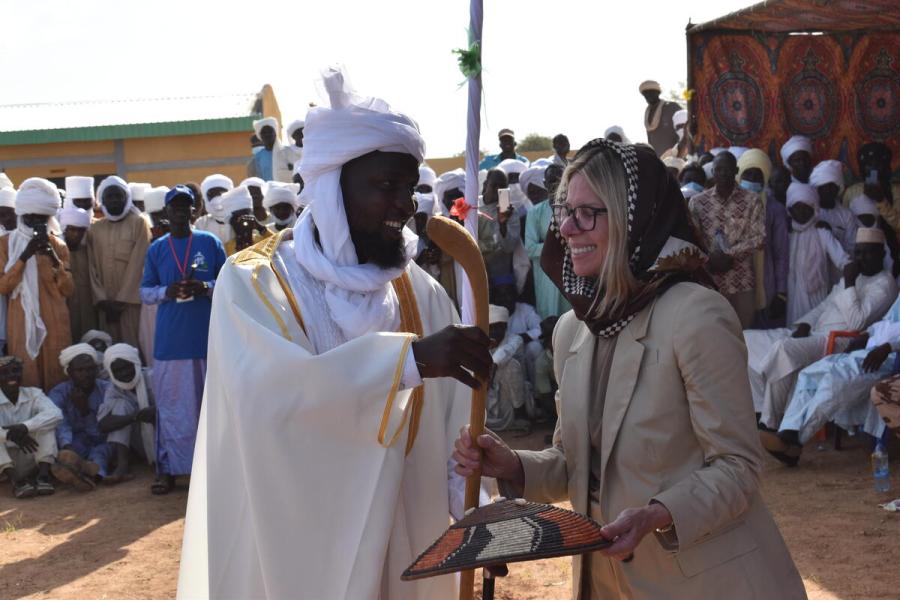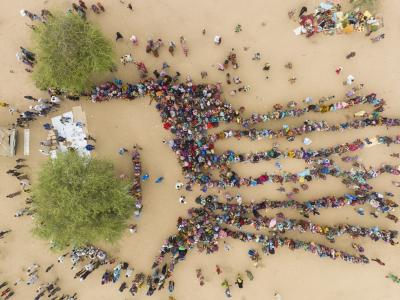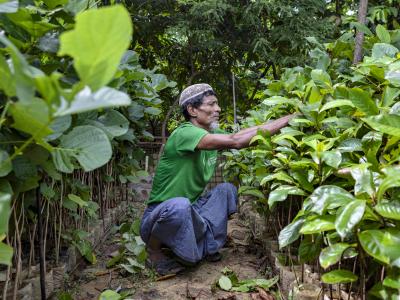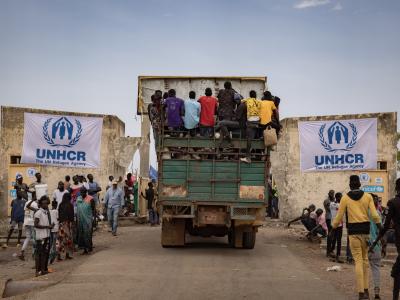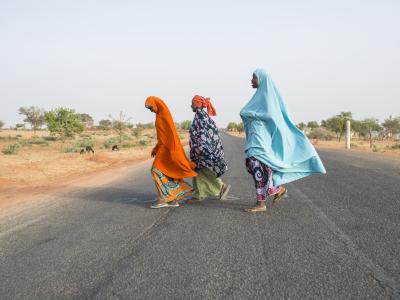Forced displacement and statelessness are not only humanitarian issues, but also medium- to long-term development challenges: both in how they impact host countries and in the potential for displaced and stateless people to contribute to economies and societies. At the end of 2023, 75% of refugees were hosted in low- and middle-income countries, and Least Developed Countries provided asylum to 21% of the total. The affirmation of the Global Compact on Refugees (GCR) in 2018 recognized that sustainable solutions to refugee situations cannot be achieved without multi-stakeholder cooperation in support of national governments. UNHCR is seeking to change the way we think and to increase the involvement of development actors in support of refugees: they can help to bring about shifts, including economic and social changes, that benefit large numbers of forcibly displaced and stateless people in fundamental and far-reaching ways.
In 2023, UNHCR set out its "Strategy on engaging development actors”, which incorporated findings from an evaluation of its work in humanitarian-development cooperation since 2021, “How to stay the course”. The strategy focuses on deepening partnerships with development actors, tapping into their expertise and leveraging their financial and technical resources, for the benefit of affected populations and the countries hosting them. It is underpinned by four core objectives:
-
increased commitment to protection and inclusion;
-
improved equitable access to public services;
-
increased economic activities and employment opportunities; and
-
increased voluntary returns of refugees and internally displaced people to areas where they can live self-sufficiently and in safety.
The 2023 Global Refugee Forum yielded several multi-stakeholder pledges with important new commitments towards these objectives. At the forefront was the “Common position” on addressing forced displacement with a comprehensive approach beyond humanitarian assistance, which was adopted by members of the OECD’s International Network on Conflict and Fragility, multilateral development banks, UN entities and others.
Another multi-stakeholder pledge, led by Japan and UNDP and backed by 72 partners, called for more effective “nexus” approaches – joined up humanitarian, development and peacebuilding initiatives – to resolve forced displacement. This was reinforced by a multi-stakeholder pledge on peacebuilding and conflict prevention, supported by 32 partners including seven key countries of origin, who pledged to expand peacebuilding and conflict prevention efforts to address root causes and create conducive conditions for safe and dignified return, and reintegration.
Bilateral development actors also started to take a more prominent role, raising displacement issues in their policy dialogues with national authorities, as demonstrated by the German Ministry for Economic Cooperation and Development (BMZ) and the EU. In addition, Belgium and the Agence Française de Développement (AFD) set new and specific targets for expanded support, either committing to include forcibly displaced people more consistently in their development programming or by allocating a significant amount of funding within their fragility instrument to forced-displacement programming. The Kingdom of the Netherlands committed to support joint programming by development and humanitarian actors, pledging 800 million euros over 2024-2027, targeting refugees and host communities in eight countries across Africa and the Middle East.
BMZ commissioned a review of the extent to which its dedicated financing instrument – the Special Initiative “Displaced Persons and Host Countries” – promotes the inclusion of forcibly displaced people in national systems. UNHCR highlighted opportunities to promote such inclusion in the Special Initiative’s programmes, which totalled 420 million euros in 2023.
UNHCR worked closely with regional development banks, including the African Development Bank (AfDB), Asian Development Bank (ADB), Islamic Development Bank (IsDB), and Inter-American Development Bank (IADB) in 2023. AfDB increased its engagement in forced displacement in Africa, taking a leading role in the Core Group of the Central African Republic Solutions Support Platform, and spotlighting forced displacement at the Africa Resilience Forum, which generated a conversation on the financing gap among humanitarian, development and peace actors. A UNHCR project on entrepreneurship support to refugees and host communities in South Sudan received $1.28 million in AfDB financing.
At the Global Refugee Forum, the multilateral development banks belonging to MDB Coordination Platform on Economic Migration and Forced Displacement renewed their commitment to expand their coordination and deepen their cooperation with all relevant stakeholders in the MDB community, with member countries and relevant specialized organizations, including UNHCR.
The World Bank Group increased the number of States supported through its dedicated financing instruments, with Zambia and Armenia respectively becoming eligible for the International Development Association’s Window for Host Communities and Refugees (WHR) and the Global Concessional Financing Facility (GCFF).
With the Bank’s focus on fragility, conflict and violence, the WHR has provided crucial support to millions of refugees in 17 eligible countries, having funded 93 projects (active and in the pipeline) that improve the lives of refugees and host communities. Across the IDA18, IDA19, and IDA20 cycles, the total investment has amounted to $4.27 billion, underscoring the World Bank's commitment to building a brighter future for refugees and their host nations. Three countries (Togo, Benin and the CAR) are expected to attain eligibility in 2024. The Bank published the first ever poverty assessment for the CAR in 2023, setting out a “Road map towards poverty reduction”.
The Global Concessional Financing Facility (GCFF) has also mobilized impressive support for middle-income countries hosting large refugee populations. With $853 million in grants approved for active initiatives, the GCFF has unlocked $7 billion in concessional loans from partner development banks and supporting donor countries. These funds have supported 32 projects across job creation, essential public services like health care and education, and sustainable infrastructure development in six GCFF refugee-hosting countries.
The International Monetary Fund (IMF) also increased its attention on forced displacement in 2023. In line with the Managing Director’s global policy agenda, the IMF recognizes the macro-criticality of forced displacement, as reflected in recent IMF surveillance, programmes and analytics.
The IMF published papers on “Macroeconomic shocks and conflict” and “Climate challenges in fragile and conflict-affected States” and its “Regional Economic Outlook” also included a feature on the conflict in Sudan and refugees’ spillover. These products have been catalytic in building evidence on the impact of forced displacement, which is helping to inform countries’ inclusive policies.
The World Bank-UNHCR Joint Data Center on Forced Displacement (JDC) has helped to significantly increase the quality and quantity of socioeconomic data and analysis on forced displacement available to policymakers. In 2023, its portfolio grew by 10 additional projects, with 43 ongoing national activities across 35 countries and 19 global activities, all of them in response to operational needs and policy dialogue. There are now close to 800 socioeconomic datasets available on the UNHCR Microdata Library. At the Global Refugee Forum, the JDC co-led a multi-stakeholder pledge on “Inclusion of forcibly displaced and stateless persons in national statistical systems and surveys”, with around 100 pledges from host countries, donors and other stakeholders.
UNHCR and the World Bank Group’s private sector arm, the International Finance Corporation (IFC), launched the IFC-UNHCR Joint Initiative (JI) in January 2023. Hosted in the IFC Istanbul office, the JI fosters market-based approaches by supporting the private sector to provide jobs, opportunities and services to refugees and their hosts. The JI aims to leverage the business sector to develop local economies in forced displacement contexts in a more sustainable way.
In September 2023, the IFC partnered with Santander Bank Polska in Poland, offering a $17 million guarantee that would free up about $100 million in capital for loans to forcibly displaced Ukrainians and companies hiring them. To promote similar market opportunities for financial service providers, the JI designed a model of financial inclusion gap assessments and conducted such assessments in Africa, Europe and Latin America.
UNHCR also deepened its UN partnerships to support the inclusion of forcibly displaced and stateless people. As part of their global collaboration, UNHCR and UNDP digitized their existing appraisal tool and rolled it out in three new countries – Iraq, Mozambique and Somalia. UNDP and UNHCR also finalised a “Joint roadmap on advancing access to justice in situations of forced displacement”, which guides both agencies on ways to further collaboration at the country, regional and global levels.
UNHCR and ILO also pool their expertise to support forcibly displaced people’s access to the labour market, decent work conditions and social protection. The partners agreed a new “joint action plan 2023-2025” and prepared to start the second phase of the PROSPECTS partnership, spearheaded and funded by the Kingdom of the Netherlands, which will support efforts at bringing refugees into national systems in countries such as Kenya, which launched a major drive for livelihoods and economic inclusion in 2023.
Despite all this progress, official development assistance for developing nations has come under pressure due to States’ competing priorities and increased investments on energy and defence, in-country refugee costs and ongoing war. All this reduced the appetite for risk and the focus on displacement settings. It is vital that despite these challenges, resources and technical support continue to be afforded by development actors to support States to meaningfully include refugees, IDPs and stateless people in development agendas and programmes.
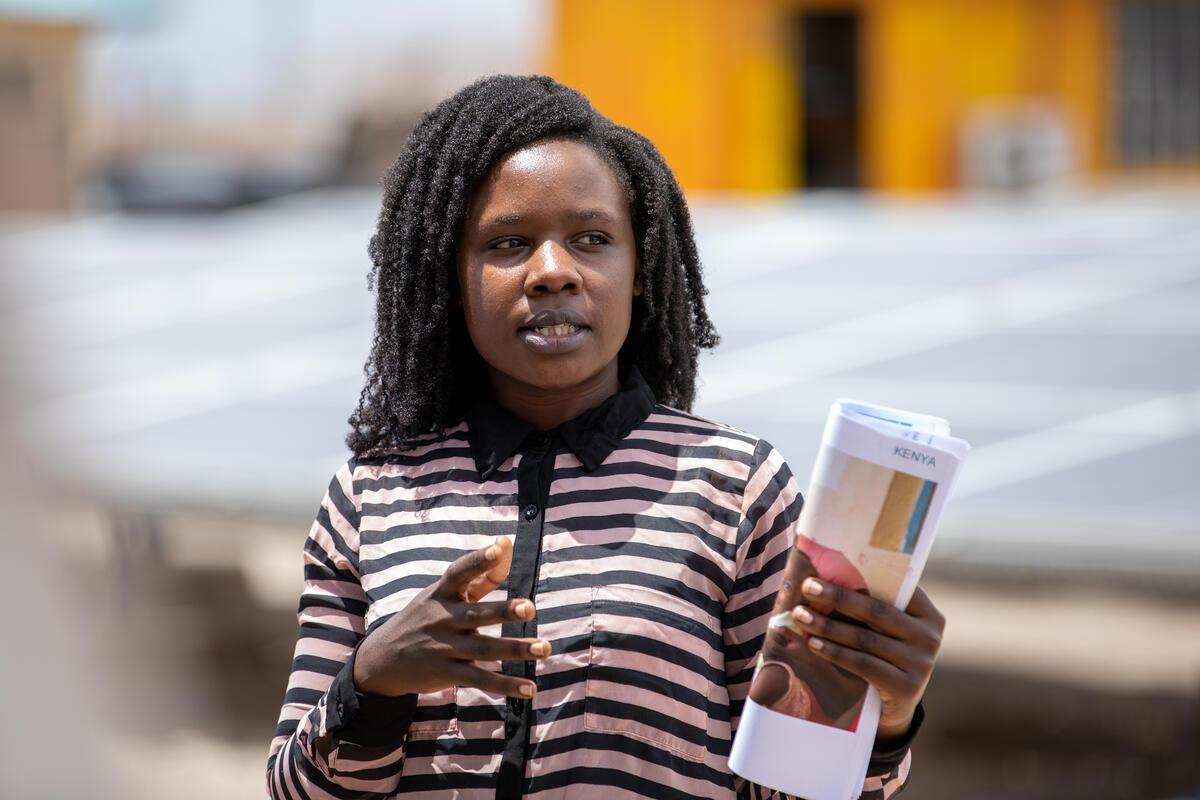

IKEA Foundation helps fund vital data on refugee situations
Since 2010, the IKEA Foundation and UNHCR have worked together to create sustainable solutions for refugees, internally displaced people, and host communities. The IKEA Foundation made a multi-year donation of $1.2 million in 2021 to help fund the Joint Data Center on Forced Displacement over three years, 2021-2023. A partnership between UNHCR and the World Bank, the JDC supports data collection and analysis in over 30 countries across four continents, covering some of the world’s largest displacement crises.
Thanks to the IKEA Foundation and other supporters, more socioeconomic data on refugees, internally displaced and host populations is available to governments, development and humanitarian organizations, enabling them to make informed decisions about how best to meet the needs of forcibly displaced populations.
